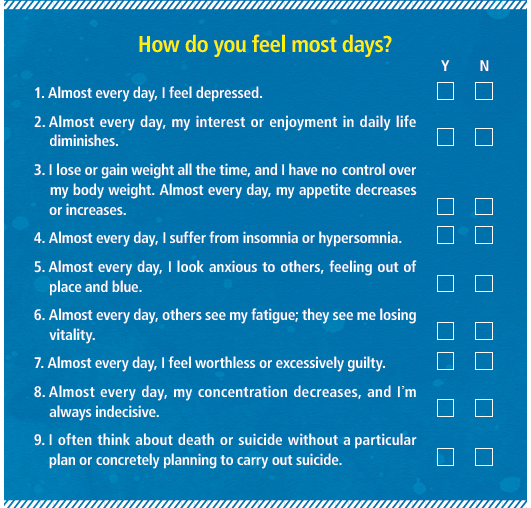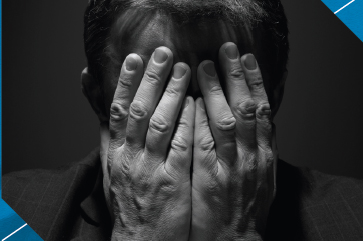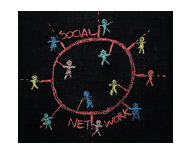

According to the announcement of World Trade Organization (WTO), depression is one of the three main causes of distress among mankind, along with cardiac disorders and traffic accidents. It is an old and prevalent mental illness, and this phenomenon will continue. This illness affects in 20 to 25 percent of the world population to suffer from depression at the level of mental sickness.
Increasing rapidly from adolescence, the average age of onset for this disease is the mid-20s, which means that undergraduate students are likely to suffer their first major depressive episode. The UOS Times concentrated on MDD, a category under the more general range of depressive disorders. Depressive disorders take many forms, including temporary grief or bereavement over loss of a relationship or death of a family member. These are episodic, reactive depressions. However, MDD continues throughout a person’s life, and it may not have a single, direct external cause. First, let’s define MDD and become more aware of causes and ways that people in their 20s particularly may cope with its symptoms.
The check list on the left shows the criteria for diagnosing MDD with reference to the Diagnostic and Statistical Manual of Mental Disorders, Fifth Edition (DSM-5). To be diagnosed with this illness, a patient must display five to nine symptoms almost every day, continuously for at least two weeks. At least one symptom must contain, first, a continuous feeling of depression; second, notably decreasing enjoyment. As we read this list, we can see that MDD is different from just feeling blue, and that this mental illness is not caused simply by a lack of will.
Shin Yun-jeong is an associate professor of counseling who has taught a course called Understanding of Psychology for several years at the University of Seoul (UOS). According to materials that Prof. Shin presents in her psychology course, main causes of this illness are environmental factors and hereditary traits, sometimes both working in tandem.
A hereditary cause refers to an innate vulnerability to psychological disorders. In fact, a person who has a family history of depressive disorder has 1.3 to 5 times higher chance of suffering from the disorder than others. Also, one of the primary traits of major depressive disorder is that it has a high risk of recurrence. Some 50 to 60 percent of those who have suffered depression experience a relapse. Moreover, 90 percent of third-time sufferers will suffer a fourth episode. Because of these characteristics, it is important to receive an appropriate treatment at the right time to prevent recurrence.
Psychologists such as Prof. Shin have identified university students as a set of trigger or causes that may lead to an episode of MDD.
Depression does not occur unexpectedly. It starts from feeling blue. There are many reasons for feeling blue, and we will focus on several causes which are related particularly to university students. The following terms referring to triggers of depression are not official but are commonly used for convenience.

People who suffer from “New semester syndrome” feel stressed in the middle of setting a new goal for a new semester and getting used to a new environment. They usually do not want to go to school, cannot focus, and feel tired in class; they even have a headache or feel dizzy. Kim Sang-soo, chief counselor of the student counseling center of UOS, said the reasons for gloom and stress are thought to be a change of surroundings, repetition of subtle events, and lack of social support. He also offered an analysis of why university students become depressed and stressed.
These reasons have not changed over the last few years, but they have been exacerbated by their surroundings?personal relations, management of credit, career decisions, etc. Prof. Shin said “Freshmen often enter a university, after having gone through a particularly hard time. Many high school students prepare assiduously and diligently for the entrance examinations for university.” She added.
“Such labor leaves them bereft when they actually enter the university. Freshmen have achieved that goal, but they have to set up a new goal again regarding their careers.” Shin emphasized that there were lots of students who looked for steady jobs and who, out of loyalty, did what they were told by their parents. She thought, however, that it was a problem that students did not know what they wanted to do, which eventually haunted them as stress.

It is hard to find someone who is experiencing “Masked depression” because, as the term implies, symptoms are not apparent. Sufferers may seem outgoing when they are among other people. However, this condition has many different symptoms, including flu, problems in menstruation, insomnia, headaches, and indigestion. Also, people may suffer from loss of appetite, fatigue, inability to concentrate, and dependence on alcohol and drugs.
“Masked depression” is also called “Smile-mask syndrome,” and it frequently appears among celebrities or people in the service industry. University students can easily become included in the latter because they work in the hospitality industry in part-time jobs such as restaurants, bars, or convenience stores. They are required to respond to guests with a smile.
This syndrome also appears as students try to maintain good interpersonal relationships. Relationships at a university are much different compared to that of high school. It is a challenge to become intimate and maintain that intimacy with new people. Unlike before, the network of personal relationships is more complex, and risks of losing self-esteem are much higher. As young people get mature, it becomes more important to maint ain good relationships. People assess themselves based in part on their relationships, thus leading to stress and self-consciousness.

It may come as tragic news to any coffeeholic to hear that caffeine can cause depression, but this does not mean “caffeine” in a literal sense. The term “Caffeine depression” refers to the initial letters of the three major social network services (SNS) in Korea: “KA” from Kakao, “FA” from Facebook, and “IN” from Instagram.
In its March 2015 issue, The UOS Times discussed SNS, or social media as it is known in the west, with a focus on how thoroughly it is ingrained in our lives. Social media has various merits. We can learn from how other people live, make personal connections with a larger number of people than ever before, and share the important moments of our daily lives. There is an aspect of it, however, that may have an undesired psychological effect; many people derive satisfaction from social media based on whether they are “liked” or “followed.” Likewise, if they do not receive “enough” affirmation by being liked or followed, they feel under-appreciated and devalued. Some critics of a social media assert that, over time, the weight of being liked or not liked can lead to lower self-esteem, especially in those who are already vulnerable to depression.
Considering these psychological risks, why do people continue to participate in social media? According to a survey by the Korea Communications Commission and the Korean Internet Security Agency in 2012, friendship and dating accounted for most of the use in social media. Keeping track of daily life in terms of sharing feelings with friends was also frequently used. Many people also used social media to keep journals or attend meetings and conferences. With these more practical uses, SNS has become a necessary part of daily life, and not only social.

Many students are doing their best to find a job, but they are hard put to it for many reasons. Continuous failure in employment exams leads some to fall into despair, and they also suffer from a sense of inferiority while watching their friends find jobs. In times past, there was more hope for people who tried hard to find work, but in an increasingly competitive and unsupportive environment, even the highest qualifications seem insufficient. Under these circumstances, how can one find even a beam of hope?
MDD is like a psychological cold but symptoms of this illness have more serious problems. A quarter of the world’s population suffers from this mental illness. Some patients may not even recognize that they are ill. However, disregarding MDD may lead to it getting out of control. Anyone who suspects they may be suffering from it should receive a professional help from counselors or psychiatrists. To treat it at the right time, it is important to find triggers for a mental disorder; unfortunately, in general, people are reluctant to seek this help by themselves.
There are reasons for this reluctance, as well.
First, there is poor recognition in society about people who suffer from mental disorders such as depression. For treatment purposes, it is not odd to take counsel from friends, but many people often choose not to ask for professional helps and misguidedly think talking to friends will suffice. Statistics show that males in particular show to turn to alcohol and smoking to solve their problems of depression.
Another reason pertains to culture; people especially in Korea place great emphasis on saving face, and with this, a concern for privacy. As Prof. Shin pointed out that people tend to think it is embarrassing to expose personal matters in eastern culture, while people in western culture have begun to accept treatment as a positive effort to improve themselves.
When people receive treatment for their mental disorder, they worry about the privacy of their medical records. Although treatment and diagnoses are recorded, confidentiality is a legal guarantee. Thus, according to what Shin said, a client does not need to worry about disclosure of their psychiatric history.
A third reason is that mental illness is not widely recognized as a disease because it is not physical. Shin said that in the east people thought of suffering a cancer as different from suffering a depressive disorder. In Korea, there are many mental health professionals, as in the west, but they work mainly in the cities. Shin criticized the current situation in Korea. While adults neglect their psychological symptoms to avoid spending money on counselors, parents of children and adolescents with mental disorders are willing to pay for the sake of their children. This market trend leads psychologists to advertise themselves as specialists in treating children and adolescents, leaving adults with fewer options for treating their own problems.
A financial problem is the last, but not the least important reason. Usually, counseling or therapy goes on minimum ten weeks, with meetings once a week. Typically, a single onehour counseling session costs 100,000 won. The problem occurs when a client is unaware of the counseling or therapy process. Clients hope to be treated quickly, and they also expect advice from counselors. However, treatment is possible only after counselors have adequately listened to what clients have to say. Clients who expect to be treated instantly become disappointed by the slow progress and stop going to sessions. Better understanding of the process of therapy and counseling is needed. Clients should allow plenty of time, at least ten sessions, once a week. Koreans can currently have counsel at the Healthy Family Support Center. For information on the free regional counseling centers in the area where you live, dial 1388.
Depressive disorders are closer to us than we might think. Many people may be suffering from its symptoms, but attribute them to something else. Many may consider their suffering to be just a normal part of life. However, people who are at greater risk of depression, but who do not recognize it, actually stand out from others. Kim Sang-soo mentioned that there were quite a number of sufferers who realized that they were experiencing depression, and that they contacted the student counseling center. Nevertheless, there are more students who do not ask for help because their symptoms go inactive. This is a message for those students: “There is hope as long as you remain as active as you can. Do not be afraid of talking about what you feel. Take courage, go to the counseling center, and start to seek happiness.”
Help within UOS!
The UOS Student Counseling Center was established in 2001, and there are now eight counselors under the supervision of the chief counseling officer. They have developed programs for individuals as well as groups of students who face similar psychological issues. In 2007, the center launched an online counseling service called “Help Me.” On the center,s website, students can also perform self-diagnostic tests to decide if they may need assistance with psychological issues.
One counselor at the center described the counseling process this way; once a student has asked for help, counselors explore environmental traits and negative automatic thoughts. Through this process, it is possible for counselors to understand how students interpret significant events in their lives and then to have conversations to determine if there is a correlation between the meaning of those events and symptoms of depression.
Next, counselors examine the validity of negative thoughts and train them to change their habitual negative thoughts into positive thoughts. Finally, counselors try to modify a belief that may not be working into a more rational, realistic and functioning belief. Each counselor has psychotherapy. One such specialty is recognition behavior therapy, through which patients may examine a specialty in a sub-field of depressive disorders by recognizing cognitive errors and false beliefs arising from negative automatic thoughts.
Lee Sang-yeop
syl0616@uos.ac.kr
Lee Ji-yeon
wldusl0083@uos.ac.kr

